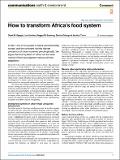Files in this item
How to transform Africa's food system
Item metadata
| dc.contributor.author | Ogega, Obed | |
| dc.contributor.author | Korsten, Lise | |
| dc.contributor.author | Oti-Boateng, Peggy | |
| dc.contributor.author | Odongo, Dorine | |
| dc.contributor.author | Thorn, Jessica | |
| dc.date.accessioned | 2024-02-27T16:30:06Z | |
| dc.date.available | 2024-02-27T16:30:06Z | |
| dc.date.issued | 2024-02-12 | |
| dc.identifier | 299240392 | |
| dc.identifier | 0e515bae-bcb6-4d3f-9429-5cef880128bc | |
| dc.identifier | 85185286763 | |
| dc.identifier.citation | Ogega , O , Korsten , L , Oti-Boateng , P , Odongo , D & Thorn , J 2024 , ' How to transform Africa's food system ' , Communications Earth & Environment , vol. 5 , 82 . https://doi.org/10.1038/s43247-024-01250-9 | en |
| dc.identifier.issn | 2662-4435 | |
| dc.identifier.other | ORCID: /0000-0003-2108-2554/work/153452081 | |
| dc.identifier.uri | https://hdl.handle.net/10023/29360 | |
| dc.description | This paper has been produced with the financial assistance of the European Union through the African Research Initiative for Scientific Excellence (ARISE; Grant no. DCI-PANAF/2020/420-028). | en |
| dc.description.abstract | In 2021, one in five people in Africa was affected by hunger, and the continent had the highest prevalence of undernourished people globally. We argue that food systems in Africa can be more resilient if their development includes climate adaptation. About 64% of the world’s available arable land is in Africa. The continent is also host to a young workforce, and a range of traditional agricultural practices and emerging technologies that can revolutionise food production and trade. Yet, the number of undernourished African people is rising, with an increase from 15.5% to 20.3% between 2010 and 20213. The population in Sub-Saharan Africa is expected to almost double by 2050, to reach about 2.1 billion people4, which will further increase demand for food. While efforts are being made to enhance Africa’s food security and resilience, existing food systems have not properly addressed its needs and priorities. We propose five pathways to help shape and transform Africa’s food systems, drawing on ideas discussed at a session at the Adaptation Futures Conference held in October 2023 in Montreal, Canada that was convened by the African Research Initiative for Scientific Excellence programme. The pathways range from the development of food systems on urban fringes to revamping urban agroforestry policy and practices; reforming land use policies; investing in research, technology, and innovation; and minimizing inequalities in adaptive capacity strengthening. | |
| dc.format.extent | 3 | |
| dc.format.extent | 749430 | |
| dc.language.iso | eng | |
| dc.relation.ispartof | Communications Earth & Environment | en |
| dc.subject | 3rd-DAS | en |
| dc.subject | SDG 2 - Zero Hunger | en |
| dc.subject | SDG 13 - Climate Action | en |
| dc.subject | SDG 15 - Life on Land | en |
| dc.subject | NIS | en |
| dc.title | How to transform Africa's food system | en |
| dc.type | Journal article | en |
| dc.contributor.institution | University of St Andrews. School of Geography & Sustainable Development | en |
| dc.identifier.doi | 10.1038/s43247-024-01250-9 | |
| dc.description.status | Peer reviewed | en |
This item appears in the following Collection(s)
Items in the St Andrews Research Repository are protected by copyright, with all rights reserved, unless otherwise indicated.

